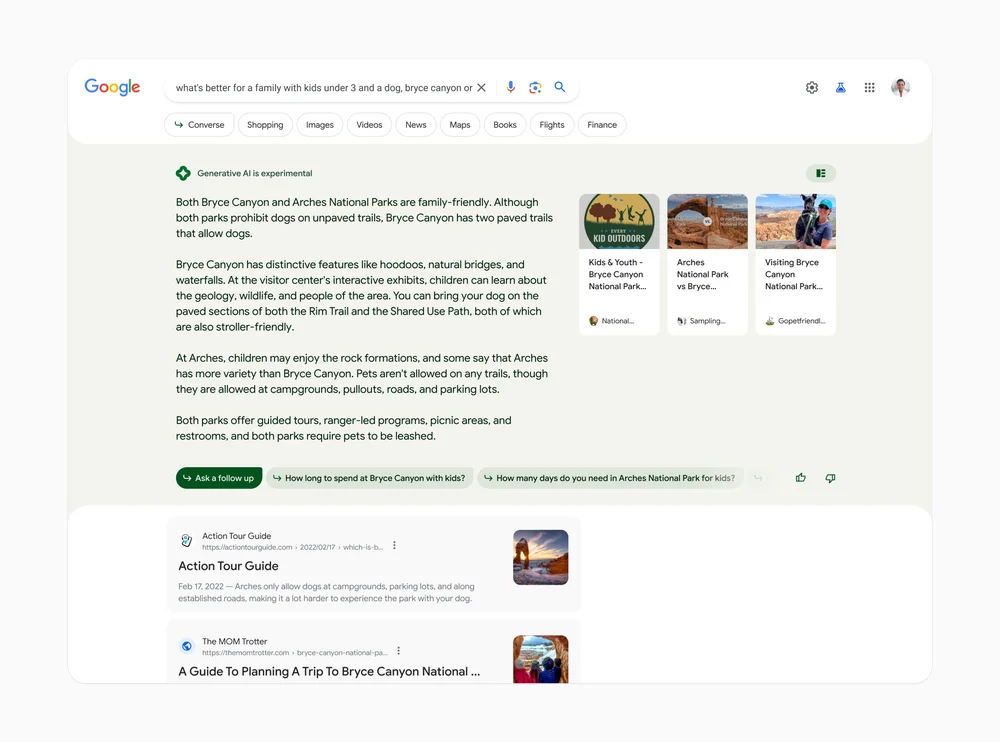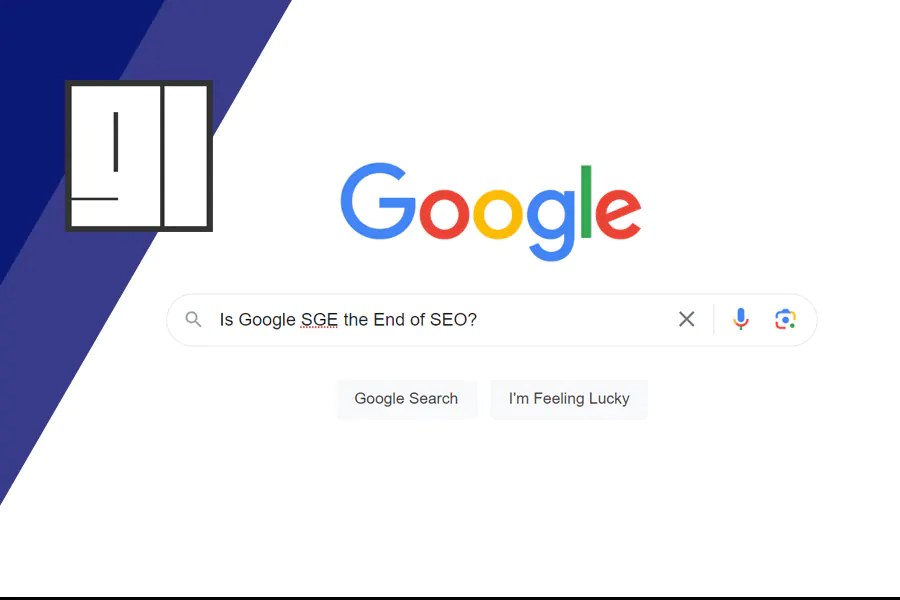Is Google Search Generated Experience the End of SEO?
So, is Google Search Generated Experience the end of SEO? You want the quick answer? No, Google’s SGE is not the end of SEO.
Still here? OK, you want some background: As technology advances, so too must our approach to optimizing search engine results through SEO. This article takes a look at how AI and machine learning are changing the way we use Google Search. It also explores what these changes could mean for SEO tactics.
We’ll dive into how generative AI is integrated into Google Search and discuss its limitations for certain queries. Next, we’ll examine the importance of adhering to Google’s Quality Guidelines and how algorithm updates like mobile-first indexing affect website rankings.
Additionally, we will cover passage-based indexing and product review guidance, which offer new opportunities for content creators. We will also delve into the rise of AI writing technologies such as GPT-3 and OpenAI Codex API, discussing their capabilities and implications for SEO professionals.
Finally, you’ll learn how to adapt your SEO strategies in response to these AI-driven search experiences – ensuring that your online presence remains competitive in a rapidly changing digital landscape. So join us as we explore whether or not Google search generated experience truly signals the end of traditional SEO practices.
AI-Driven Google Search Generated Experience
The advent of AI-powered Google SGE has led to a significant shift in the search engine landscape. This technology provides users with an enhanced search experience by displaying an AI-generated answer above the search results listings, synthesizing information from various sources and offering more answers supported by multiple sources below the results.

Source: Google
Quality Raters for Early Testing of New Method
To ensure that this new method meets Google’s quality guidelines, they employed human quality raters for early testing. These individuals play a crucial role in assessing whether or not generated content aligns with user intent and delivers accurate, relevant information.
Five-Point Strategy for Incorporating Generative AI into Search
- User experience: Prioritize delivering a good experience tailored to individual preferences and needs.
- Multisource synthesis: Combine data from multiple reliable sources to provide comprehensive answers.
- Natural language understanding: Utilize advanced NLU techniques to interpret complex queries accurately.
- Data freshness: Regularly update content based on real-time changes within industries or fields of interest.
- Safety & trustworthiness: Ensure generated content adheres to strict safety standards while maintaining user trust through transparency measures such as source attribution where appropriate.
Incorporating these five key elements allows Google Search Generated Experience (SGE) to deliver a more satisfying user experience, which ultimately benefits both search engines and SEO professionals alike. By staying informed about the latest advancements in AI-driven content creation and adapting strategies accordingly, marketers can continue to thrive in this ever-evolving digital landscape.
AI-Driven Google Search Generated Experience is a game-changer for the industry, offering users an improved and more personalized search experience. Despite its advantages, AI-powered Google Search still has certain restrictions that need to be addressed before it can reach its maximum capability; let’s explore these now.
Revolutionizing search experience, Google’s AI-powered SGE is changing the game for SEO. Stay ahead with a 5-point strategy for success. #SEO #AI
Limitations of Generative AI in Search
Although generative AI has the potential to be a great solution for many search engine issues, it is essential to acknowledge its constraints. While AI-powered Google Search Generated Experience (SGE) has undoubtedly revolutionized user experience and search results, there are still some areas where traditional SEO strategies hold their ground.
Complex Queries Requiring Human Expertise
The truth is, not every query can be answered by generative AI technology. Some questions require a level of human expertise or understanding that even the most advanced algorithms struggle with. For instance, queries related to niche industries or highly specialized topics may not receive accurate responses from an AI-driven system alone.
Sensitivity Concerns within Specific Industries
Beyond complexity issues, certain domains demand a higher degree of sensitivity when providing information – think finance and legal sectors. In these cases, relying solely on generative AI could lead to misleading or potentially harmful content being displayed in search results. As such, SEO professionals must continue honing their skills and knowledge for these particular industries.
- Maintain relevance: Stay up-to-date with industry trends and news so you can create high-quality content that addresses users’ needs effectively.
- Diversify your skillset: Learn about emerging technologies (like voice search) while also refining your traditional SEO techniques for better adaptability.
- Prioritize user experience: Remember that Google’s quality guidelines emphasize providing a good experience for users, so focus on creating content that is informative, engaging, and easy to navigate.
In short, while generative AI has certainly changed the game in terms of search engine optimization, it doesn’t mean we can abandon traditional SEO practices altogether. By staying informed about the latest developments and adapting our strategies accordingly, we can continue to thrive in this ever-evolving digital landscape.
Generative AI in search has its limitations, but with Google’s constant updates to their algorithms, SEO practices must also evolve.
Main Takeaway
Artificial Intelligence (AI) has made searching online more user-friendly and accurate, but it’s not perfect yet. There are still tough questions that need a human touch, and some areas need careful handling.
So, people who work in search engine optimization (SEO) – that’s making sure a website shows up in search results – need to keep their skills up-to-date, focus on making user experience the best it can be, and stay relevant.
All this will help them succeed in the fast-changing world of the internet.
Evolution of SEO Practices Amidst Google Updates
SEO isn’t what it used to be, folks. Over the years, we’ve seen numerous updates from Google, each one shaking up the game and forcing us to adapt our strategies. Let’s take a trip down memory lane to revisit the big shifts that have reshaped our SEO strategies over the years.
Medic Update (2018) targeting health-related sites
In 2018, Google dropped the bombshell known as the Medic Update. This update specifically targeted health-related websites, scrutinizing their content for quality and expertise. If you’re in this niche or any other sensitive industry like finance or legal services, you better make sure your content is top-notch and backed by solid sources – otherwise, say goodbye to those sweet search rankings.
Passage-based indexing introduced in February 2021
Folks were still reeling from the Medic Update when along came another game-changer: passage-based indexing (introduced in February 2021). With this update, Google started ranking individual passages within pages instead of just whole pages themselves. That means even if your page isn’t entirely about a specific topic but has a relevant section buried deep inside it – bam. You could still rank high on search results.
- Avoiding thin content: Google’s Quality Guidelines have always emphasized the importance of avoiding thin, low-quality content. Ensure your webpages are brimming with worthwhile data that captures and maintains user interest.
- Identifying black hat techniques: Don’t even think about using shady tactics like keyword stuffing or cloaking to game the system. Google is constantly on the lookout for these underhanded methods, and they’ll penalize you if they catch you red-handed.
- Prioritizing mobile-friendly websites: With more people searching on their phones than ever before, it’s crucial to ensure your site looks great and functions smoothly on all devices. In fact, since 2015 (Mobilegeddon, anyone?), Google has prioritized mobile-friendly sites in its search results.
In this ever-evolving landscape of SEO practices, staying informed about updates within both search algorithms and artificial intelligence technologies is essential to stay ahead of the curve. SEO professionals must keep up with Google’s guidelines and aim to create good user experience for their audience. With Google’s experience update, it’s clear that search engines are prioritizing user experience more than ever before. Content creation should focus on providing value to the user, and adhering to Google’s quality guidelines is a must.
The evolution of SEO practices amidst Google updates has been a roller coaster ride, with many highs and lows. Artificial Intelligence Writing Technologies have had an impact on the way companies view generated content, and this is something we’ll explore further in our next heading.
Main Takeaway
Google keeps changing how it ranks websites, which means people who work on getting sites to show up in search results need to keep adjusting their game plan.
For example, Google once made a change that focused on health websites, and another time they started looking at individual sections within webpages instead of the whole page.
Staying on top of these changes and following Google’s guidelines is key to making sure users have a good experience on your site and to keeping your website easy to find in search results.
Impact of Artificial Intelligence Writing Technologies on SEO
With the rise of cutting-edge technologies like GPT-3 and OpenAI Codex API, content creation has never been easier. These AI-powered tools are becoming increasingly popular among marketers looking to create engaging online material without investing the time and effort required for manual copywriting tasks. But with this newfound convenience, some industry experts question if we’re witnessing the end of traditional optimization efforts altogether, given Google’s stance against low-quality auto-generated text.
Shifts in Company’s Stance Towards High-Quality Generated Content
- User experience: As search engines prioritize user experience above all else, it’s crucial that AI-generated content meets or exceeds quality standards set by human writers. Google is adamant in its stance against auto-generated content, since it has often been employed as a tool by spammers to manipulate search engine rankings.
- Fighting spam: Historically, Google has taken a hard line against auto-generated content because it was often used as a tactic by spammers to manipulate search results. However, as AI writing technologies improve and produce higher-quality output, there is potential for a shift in perception regarding their legitimacy within the realm of SEO.
- Innovation vs regulation: Balancing innovation with adherence to guidelines can be tricky business; however, embracing new technology while staying compliant with Google’s Quality Guidelines would allow marketers to leverage these powerful tools effectively.
The key takeaway here is that while AI-generated content may not signal the end of SEO, it does require marketers to adapt their strategies and stay informed about updates within both search algorithms and artificial intelligence technologies. By doing so, they can continue to provide a good experience for users while staying ahead in this ever-evolving digital landscape.
The impact of artificial intelligence writing technologies on SEO is undeniable, and companies must consider how to best utilize these advancements in order to remain competitive. Embracing high-quality AI-generated content is essential for meeting user needs and preferences while remaining mindful of practical considerations.
AI-powered content creation is revolutionizing SEO, but it’s crucial to prioritize quality and stay compliant with Google’s guidelines. Stay ahead in the game. #SEO #AIcontentcreation
Embracing High-Quality AI-Generated Content
My tech-minded pals, it’s time to accept the truth. In November 2022, Danny Sullivan clarified that using AI-generated content is not against Google’s guidelines. Meanwhile, John Mueller added that there might be practical issues to consider. This statement indicates a shift in the company’s stance on AI-generated content and suggests that as long as it adheres to quality standards and provides value for users, such material may not face penalties.
Importance of Meeting User Needs and Preferences
- User experience: As per Google’s Quality Guidelines, providing a good user experience should always be your top priority when creating content.
- Fulfilling intent: Make sure your AI-generated pieces answer searchers’ questions or solve their problems effectively.
- E-A-T (Expertise, Authoritativeness & Trustworthiness): Ensure your content showcases these qualities by citing reputable sources and demonstrating subject matter expertise.
Practical Considerations When Utilizing AI-Generated Content
- Selecting an appropriate tool: Choose an advanced writing technology like GPT-3 or OpenAI Codex API for generating high-quality text without sacrificing creativity or authenticity.
- Edit before publishing: Always review and edit generated output thoroughly to ensure it aligns with Google’s guidelines while maintaining coherence and relevance for readers.
So, is Google Search Generated Experience the end of SEO? Not quite. But it’s clear that marketers need to adapt their strategies and embrace high-quality AI-generated content as part of their arsenal. By focusing on meeting user needs and preferences while staying informed about updates within both search algorithms and artificial intelligence technologies, you’ll be well-equipped to thrive in this ever-evolving digital landscape.
In conclusion, embracing high-quality AI-generated content is essential for staying competitive in the digital age. By adapting SEO strategies to an ever-evolving landscape and leveraging available tools and resources, businesses can foster innovation while meeting user needs and preferences.
Say goodbye to SEO headaches and hello to high-quality AI-generated content. Embrace the future of digital marketing with Google’s new guidelines. #AIcontent #digitalmarketing
Adapting SEO Strategies for an Evolving Landscape
The rise of AI-powered search experiences like Google SGE has undoubtedly changed the landscape of SEO practices but does not signal an end to optimization efforts. Marketers must adapt their strategies by focusing on creating high-quality content tailored to meet evolving user needs and preferences while staying informed about updates within both search algorithms and artificial intelligence technologies.

Source: Google
Leveraging Best Available Tools and Resources
Staying ahead of the curve in today’s competitive digital landscape necessitates making use of the most advantageous tools and resources. For instance, consider using SEO tools that help with keyword research, backlink analysis, site audits, and competitor analysis. Staying informed of industry trends through reliable sources such as Search Engine Land is key to staying ahead in the competitive digital age.
Fostering Innovation for Growth in a Competitive Digital Age
- User Experience: Prioritize user experience (UX) when designing websites or apps by adhering to Google’s quality guidelines. This will ensure users have a good experience navigating your site while also improving its chances of ranking higher on search engines.
- Content Creation: Focus on producing high-quality content that meets users’ needs rather than simply targeting keywords or gaming algorithms. Embrace new technologies like AI-generated text if they can improve efficiency without sacrificing quality – just remember John Mueller’s advice about practical considerations.
- Voice Search Optimization: With more people using voice assistants like Google Assistant and Amazon Alexa, optimize your content for voice search by targeting long-tail keywords and answering common questions in a conversational tone.
- Mobile-First Indexing: Ensure your website is mobile-friendly since Google now prioritizes the mobile version of webpages for indexation and ranking purposes. Check out their mobile SEO guide to get started.
In this ever-evolving digital landscape, it’s crucial to adapt your SEO strategies accordingly. By staying informed about industry updates, leveraging available tools, focusing on user experience, embracing innovation like AI-generated content when appropriate, you’ll be well-equipped to succeed in today’s competitive online environment.
Main Takeaway
Even though AI is changing how we search online, like with Google’s AI-powered search experiences, it doesn’t mean we stop trying to make our websites easier to find. People in marketing should focus on making great content that users will find helpful and enjoyable.
It’s also important to keep up with changes in how search engines and AI work. Using the latest tools, making sure our websites work well and look good, creating top-notch content, and making sure our sites work great on voice searches and mobile devices are all ways we can stay ahead in the online world.
FAQs
In Relation To: Is Google Search Generated Experience The End Of SEO?

Conclusion
In conclusion, while Google’s AI-powered search generated experience is changing the way SEO works, it is not the end of it. Adhering to Google’s quality guidelines and keeping up with algorithm updates will remain crucial for website rankings. Additionally, implementing new technologies such as passage-based indexing and AI writing tools can help improve content creation.
Staying informed about changes in technology and adapting strategies accordingly is essential for businesses and individuals to remain competitive. While there may be challenges ahead in terms of SEO, there are also opportunities to leverage these advancements for success.
To stay ahead of the game in this ever-changing landscape, consider partnering with Graz Laveder Tech Simplified – for SEO services and more.

Graz is a tech enthusiast with over 15 years of experience in the software industry, specializing in AI and software. With roles ranging from Coder to Product Manager, Graz has honed his skills in making complex concepts easy to understand. Graz shares his insights on AI trends and software reviews through his blog and social media.



